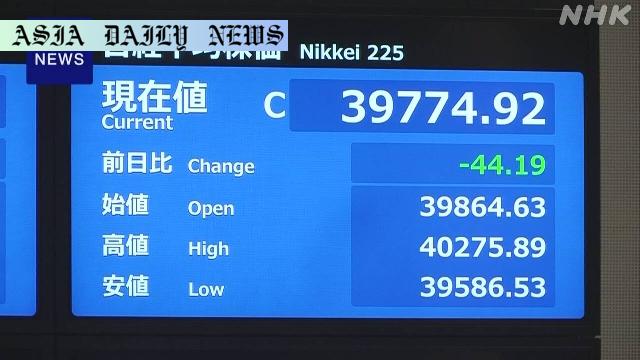Nikkei 225: Tokyo’s benchmark stock index hit key highs as it briefly surpassed 40,000 post-election, sparking mixed market reactions.
Nikkei 225 briefly surpassed 40,000, a key milestone post-election.
Profit-taking led to a minor decline, closing at 39,774.
Investors anticipate volatility with fiscal and policy uncertainties.
Prime Minister Ishiba’s continued leadership suggests stability.

Nikkei 225: Brief Surge Followed by a Marginal Decline
The Nikkei 225, Tokyo’s benchmark stock index, showcased remarkable movement as it briefly surpassed the 40,000 mark after Japan’s Upper House election. Many viewed the election outcome as anticipated, fostering initial optimism among investors. On its first trading day post-election, the index rose by over 450 points in morning trading, marking a 1.1% increase. However, the enthusiasm was short-lived, with the Nikkei closing the day at 39,774, reflecting a modest 0.1% decline.
Monday being a national holiday contributed to traders eagerly resuming activities on Tuesday. However, profit-taking activities significantly contributed to the loss in momentum. The dynamics of the market exhibited a mix of optimism and caution, reflecting the investors’ restrained enthusiasm as they prepared for potential fiscal and political uncertainties.
Impact of Election Results on Market Dynamics
The Upper House election ensured no drastic political upheaval, aiding stability, a factor investors welcomed. Prime Minister Ishiba Shigeru’s announcement to retain his position offered a sense of continuity and reliability. However, there are murmurs among some political factions opposing Ishiba’s continued tenure, which could potentially bring volatility to the market environment.
Japan’s ruling coalition lost its majority in the Upper House, raising concerns about the government’s ability to unilaterally implement fiscal policies. Opposition parties advocating for consumption tax reductions have left market participants apprehensive regarding fiscal deficits and economic stability. The yen, appreciating against the dollar post-election, briefly traded at the lower 147-yen level, showcasing cautious investor sentiment.
Stable Leadership and Its Impact on Fiscal Policies
Analysts suggest that Prime Minister Ishiba’s commitment to addressing longstanding trade negotiations with the United States is indicative of stability and might bolster investor confidence. However, fiscal policy direction remains a critical matter of speculation. Should Japan’s government concede to some opposition demands, such as cutting the consumption tax, concerns about fiscal deterioration may escalate. This situation could influence yields on Japanese government bonds, particularly for super-long bonds which remain under immense scrutiny from market participants.
Amid these circumstances, Chief Market Strategist Ichikawa Masahiro predicts that the success or failure of future fiscal measures undertaken by Prime Minister Ishiba’s cabinet will play a pivotal role in determining market confidence and yen stability.
Looking Ahead: Uncertainty Amid Promising Stability
The week following the Upper House election is expected to test investor resilience as they weigh policy speculation, potential shifts, and overall economic maneuverability by the Japanese government. While the Nikkei has lost ground, the post-election developments highlight cautious optimism rooted in leadership stability yet underscored by looming fiscal uncertainties.
Investors and analysts alike will remain vigilant of the policy approaches introduced in subsequent parliamentary sessions to gauge potential impacts on critical economic indicators such as yen valuation, bond yields, and the Nikkei index’s trajectory. With mixed sentiments dominating early trading, the days ahead stand critical for Japan’s fiscal and economic positioning on the global stage.



Commentary
Market Reactions Reflect a Blend of Optimism and Caution
The Nikkei 225’s recent trajectory lays bare the fragile balance between investor optimism and caution. Initial enthusiasm that pushed the index past 40,000 post-election reflects traders’ readiness to embrace stability and the promise of continuity in leadership. However, the subsequent dip underscores the underlying apprehensions tethered to fiscal policies and potential challenges in the political landscape. Such fluctuations are a testament to the complexity of market behavior amid a dynamically evolving environment.
Political Dynamics and the Fiscal Policy Conundrum
As the ruling coalition loses its majority, the government is likely to encounter resistance in unilaterally executing fiscal policies. This shift necessitates greater collaboration with opposition parties, several of which have advocated for reducing the consumption tax—a popular yet economically sensitive move. While consumers may welcome such a decision, market observers remain wary of its potential implications for Japan’s fiscal health, particularly its mounting debt levels. This scenario is bound to influence investor confidence and markets in the near term.
The Yen, Bonds, and Broader Implications
Investors turning to the yen amidst political stability signals a momentary respite, yet broader uncertainties loom. If fiscal policies appear misaligned with market expectations, the dollar-yen exchange rate could see significant volatility. Super-long bonds, already under pressure, could face further scrutiny, with bond yields becoming a barometer of market sentiment toward fiscal stability.
For Japan, striking a balance between economic stability and addressing consumer concerns will likely define investor sentiment and market trajectory in upcoming months. As such, carefully measured fiscal policies and transparent communication from leadership are non-negotiable for fostering lasting confidence both domestically and internationally.